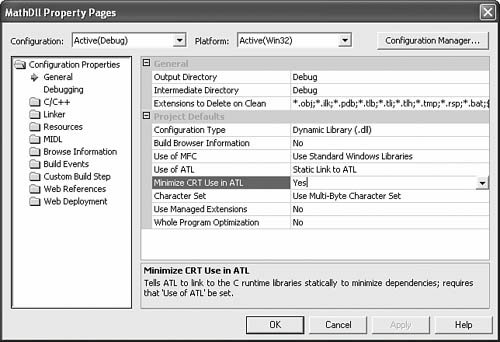ATL and the C Runtime LibraryBy default, ATL projects link with the C runtime library (CRT) in both debug and release configurations. Although linking with the CRT increases the size of each ATL server, the CRT provides useful functionality for memory management, string manipulation, and exception handling. Additionally, the CRT is responsible for calling the constructors of global objects when an executable is loaded. As a result, constructing anything but the most simplistic of projects without such important CRT functionality is impractical. In the spirit of allowing developers to minimize the memory footprint of their COM servers, ATL provides a subset of CRT functionality that can be used in place of the CRT itself. By defining the preprocessor symbol _ATL_MIN_CRT, ATL projects will not link with the CRT. You can define this symbol from the project properties, as shown in Figure 5.2. Figure 5.2. Defining _ATL_MIN_CRT in an ATL server

Setting Minimize CRT Use in ATL causes _ATL_MIN_CRT to be defined and keeps your server from linking with the CRT. It's important to realize that ATL does not make available all the functions that the CRT provides when this option is in use. If you happen to use a function that requires the CRT when _ATL_MIN_CRT is defined, you'll get the following somewhat cryptic linker error: LIBCMT.LIB(crt0.obj) : error LNK2001: unresolved external symbol _main In ATL 3 and earlier, using _ATL_MIN_CRT left out one very important feature of the CRT: static and global object initialization. Global and static objects would not have their constructors or destructors called. Thankfully, ATL 7 and later provide an implementation of this feature even without CRT support. Inproc ATL servers include an implementation of _DllMainCRTStartup that invokes global constructors and destructors. ATL itself relies upon global constructors and destructors in many key places throughout the framework. For instance, in the discussion of ObjectMain presented earlier in this chapter, I told you that ATL invokes ObjectMain when a server initializes without explaining precisely how this was done. With global constructors available both with and without _ATL_MIN_CRT defined, ATL is perfectly safe to invoke the ObjectMain methods of each class in the object map by using the constructor of the global CAtlModule instance: template <class T> class ATL_NO_VTABLE CAtlDllModuleT : public CAtlModuleT<T> { public : CAtlDllModuleT() { _AtlComModule.ExecuteObjectMain(true); } ~CAtlDllModuleT() { _AtlComModule.ExecuteObjectMain(false); } ... } |